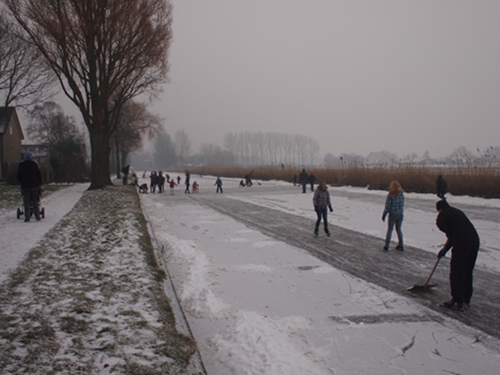 I do live in a small country of 41.526 km² and it is a beautiful country. But the question is is small more beautiful and better than big?
I do live in a small country of 41.526 km² and it is a beautiful country. But the question is is small more beautiful and better than big?
The tendency to view large institutions as leading in the development of OER also has consequences for the freedom of education. The visions and values of large institutions is not necessarily the same as of people who want to use the OER.
De neiging om grote instituten leidend te maken in de ontwikkeling van OER heeft ook gevolgen voor de vrijheid van onderwijs. de visie en waarden van grote instituten zijn niet noodzakelijk de visie van degenen die de OER willen gebruiken.
The adaptation of OER to the requirements of those who want to use in a particular context is rather complicated. “There was recognition of the importance – and difficulties – of the translator’s job. Localising OER material is not only a question of language: as one participant noted, “Culture and language [are] so closely embedded within each other that the issue of translation/location is no longer the issue of language but the issue of culture”. It is important to be aware of cultural and pedagogical differences between the original context of use and the intended new use of the material.” Unesco 2005
Het aanpassen van OER aan de eisen van degenen die ze in een bepaalde context willen gebruiken is tamelijk ingewikkeld. “Er was erkenning van het belang – en de moeilijkheden – van het werk van de vertaler. Het aanpassen van OER materiaal aan lokale eisen is niet alleen een kwestie van taal: een deelnemer merkte op: “Cultuur en taal [zijn] zo nauw ingebed in elkaar dat de kwestie van de vertaling / locatie is niet langer de kwestie van taal, maar de kwestie van cultuur”. Het is belangrijk om bewust te zijn van culturele en pedagogische verschillen tussen de oorspronkelijke context van het gebruik en de beoogde nieuwe gebruik van het materiaal.” Unesco 2005
Adaption of imported Big OER to the preferences of local users could become easier when the Big OER is cut in pieces and if people can choose to adapt some parts, generate some new parts and copy some other parts and import some parts of other OERs. Quality enhancement is easier when the OER is small. A small OER or a small separate part of an OER could quick and easy be adapted and improved by one person or some persons. This piecemeal improvement is the way most open source software grows.
Aanpassing van de ingevoerde Big OER op de voorkeuren van lokale gebruikers zou kunnen worden eenvoudiger als de Big OER wordt in stukken gesneden en als mensen kunnen kiezen om bepaalde delen aan te passen, nieuwe onderdelen maken en andere delen kopiëren en sommige delen importeren van andere OER. Kwaliteitsverbetering gaat gemakkelijker als de OER klein is. Een kleine OER of een klein apart deel van een OER kan snel en gemakkelijk worden aangepast en verbeterd door een persoon of enkele personen. Dit beetje bij beetje verbeteren is de manier waarop de meeste open source software groeit.
Just Open Access to educational resources in not enough to be called OER, “Though MIT’s OpenCourseWare is revolutionary, making content publicly available is not enough because it only focuses on the content. The proposed benefit of MOOCs, on the other hand, is “the interaction, the access to the debate, to the negotiation of knowledge–not to the stale cataloging of content” (2010, p. 32). Essentially, MOOCs and other open courses are “open” (i.e., transparent) in the practice of knowledge negotiation and developing the field of study (2010, p. 32), opposed to just allowing open access. ”
[Is MIT’s OpenCourseWare a MOOC? Michael Atkisson]
Alleen maar Open Toegang tot onderwijsmateriaal is niet voldoende “Hoewel MIT’s OpenCourseWare revolutionair is, het openbaar maken van inhoud is niet voldoende. Een MOOC, aan de andere kant, is open in ” interactie, toegang tot het debat, in het onderhandelen over de kennis en een MOOC is geen muffe catalogus met de inhoud “(2010, p. 32). In wezen zijn MOOCs en andere open cursussen “open “(dat wil zeggen, transparant) door de praktijk van kennis onderhandelingen en het ontwikkelen van het vakgebied (2010, p. 32 ), in tegenstelling tot het alleen maar geven van open toegang. ”
[Is MIT’s OpenCourseWare a MOOC? Michael Atkisson]
You must be logged in to post a comment.